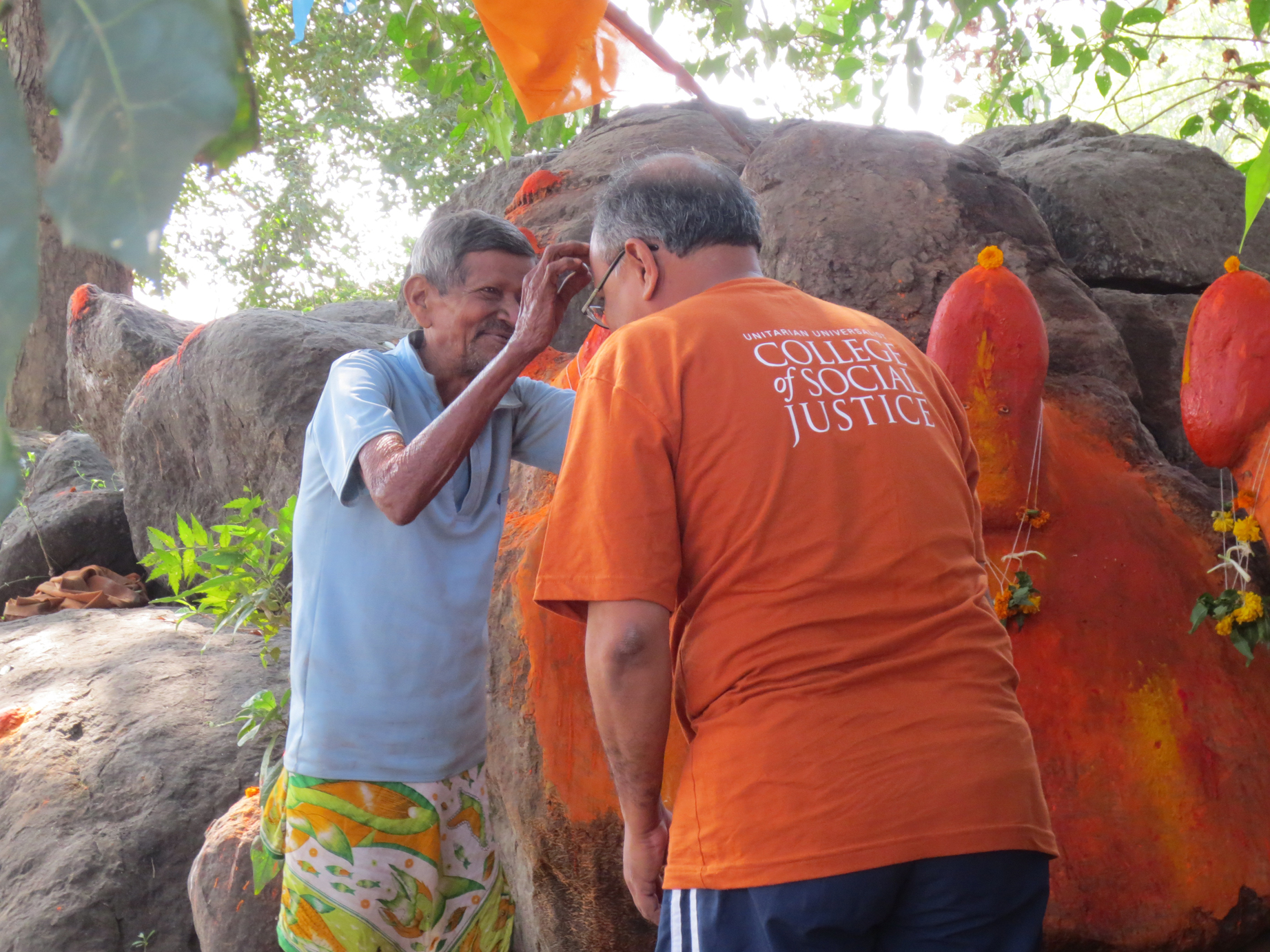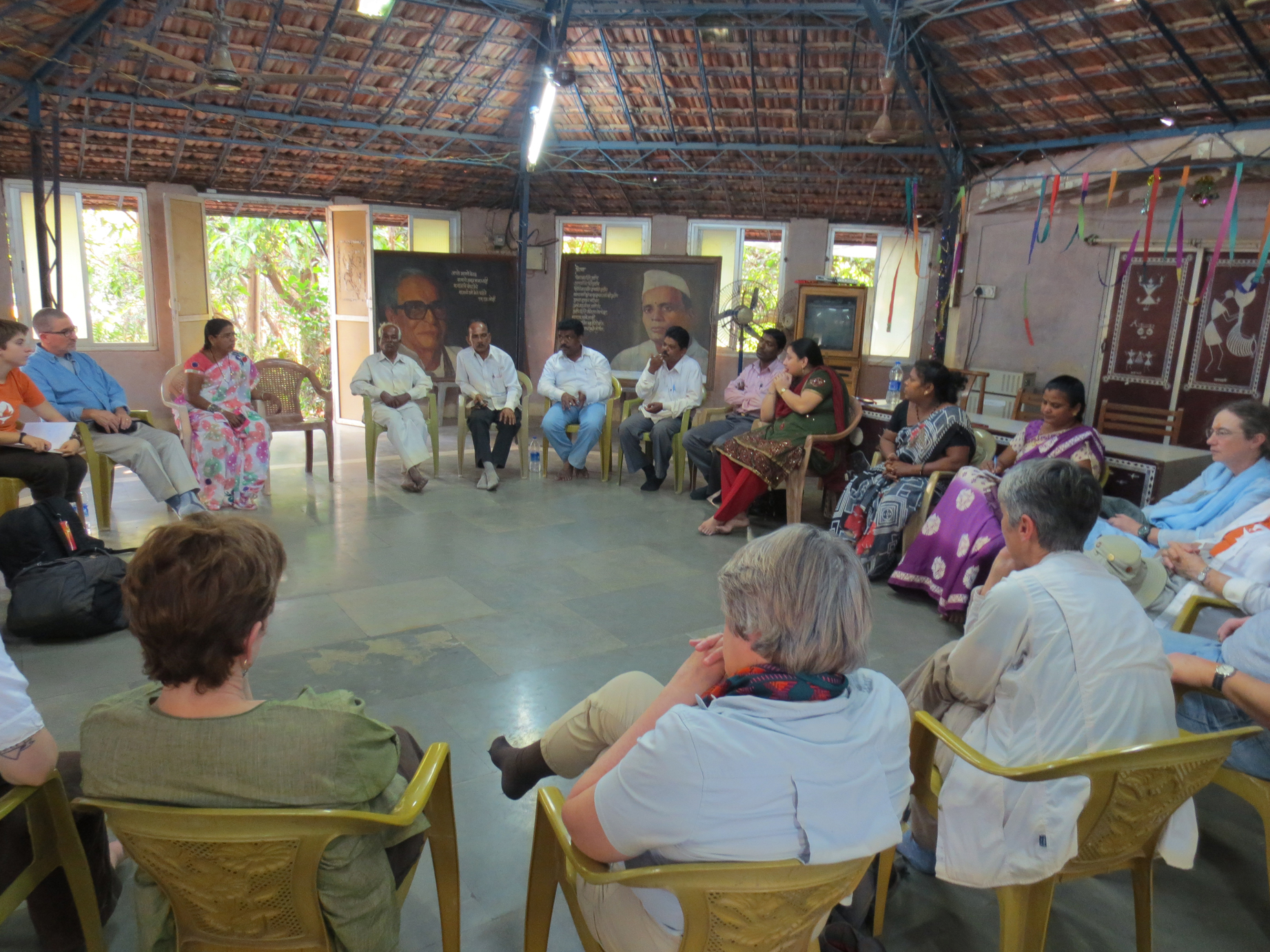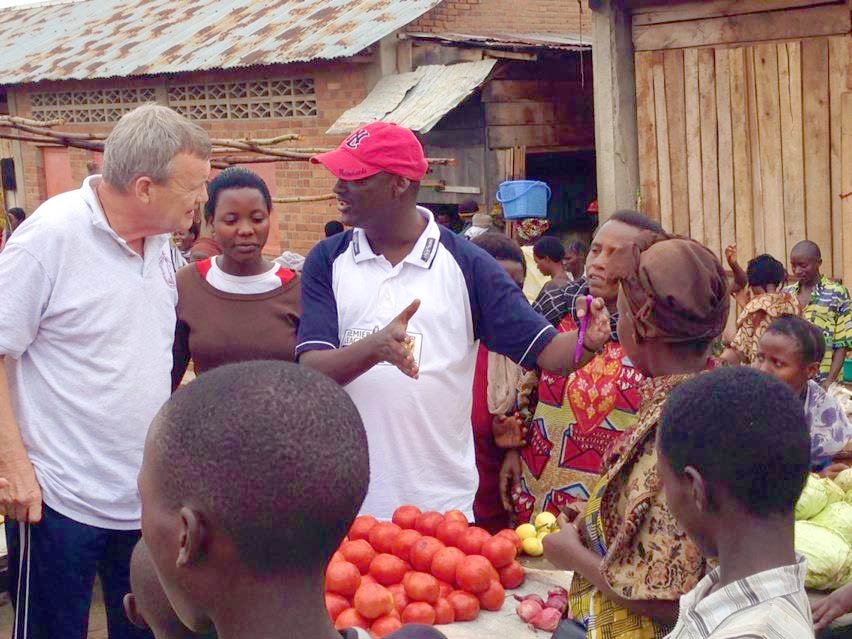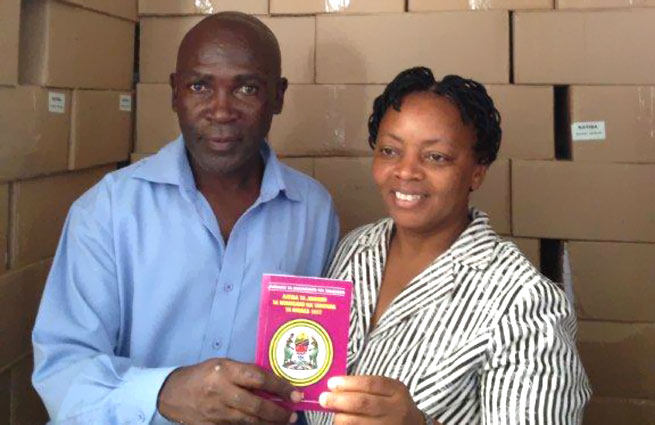
by Deva Jones | Nov 30, 2012 | India
The following post was written by Rev. Jay Leach, senior minister of the UU Church of Charlotte. He is currently taking part in a service-learning trip to explore justice for rural India with the UU Holdeen India Program.
Since disembarking from our plane in the Mumbai airport last Saturday evening, it feels as if I have been trying to drink from the proverbial fire hose of experience. The flow of sights, sounds, smells, tastes, feelings, and thoughts is at a rate that is completely impossible to imagine, must less take in.
From the seaside of one of the world’s immense cities, we came here, to the modest, bustling campus of Vidhayek Sansad, the center of such astounding activity in this area of such astounding need and opportunity. We were greeted at the gates by a procession of over 200 tribal schoolgirls clad in navy blue and white, and they enthusiastically paraded us in a pulsing procession to this remarkable place.
We’ve been learning from local tribal activists — union leaders — who have unpacked accounts of their decades of work. The depth of their clarity, conviction, and commitment easily transcends the barrier of language, which often requires translation from Marati, the state language, into Hindi, the national tongue, before making its way into English. Their accounts are of creative, powerful, often clever, and always strategic efforts to lift themselves and their people out of a complex web of oppression and exploitation.
Yesterday included a visit to a nearby small village where a centuries-old Hindu temple rises like a fortress above the swarm of the street. We were there not just to see that spectacle but to hear from other union activists about their work in organizing the temple staff to demand fair wages. Their actions included a hunger strike staged on the steep steps leading up to the temple. They also chose not to discard (as was their responsibility) the mounds of marigolds offered in homage to the deity but to fill the offices of the trust officials who employed them with the wilting blooms until the trustees agreed to negotiate.
The needs of the so-called adavasi — the “first people,” whose legal rights to these lands have been so abused — are as foreign as so much we’re encountering and as familiar as all struggles for justice and equity in which the members of our delegation are engaged. Our learning — and my learning — is taking place at the intersection of this way of strategizing for change and our individual and congregational efforts to work with immigrants, the economically deprived, the homeless, the incarcerated, and all those deprived of full equality and adequate opportunity.
Our learning continues, today with more activists, tomorrow in excursions into outlying villages to observe and document what we experience and understand about the work of these courageous agents of creative change. I’m profoundly grateful to be having this experience and look forward to unpacking it and exploring aspects of it with my congregation in the coming days, weeks, months, and years.

by Deva Jones | Nov 28, 2012 | India
The following post was written by Rev. Kathleen McTigue, director of the UU College of Social Justice (UUCSJ). She is currently coleading a service-learning trip to explore justice for rural India with the UU Holdeen India Program.
On Tuesday we traveled from Mumbai to Usgaon, the village where partner organization Vidhayak Sansad is based and where it has organized a school for 254 tribal girls from 5 to 18 years old. We received an unforgettable welcome from the children, who had gathered at the gates to meet us. They offered each of us a traditional blessing, anointing our brows with yellow and red powder and greeting us with the words that mean, “I greet the light of the god within you.” Accompanied by drums, the girls then danced up the pathway and led us to the main center, where we learned about the power of collective action in rural India.
Vidhayak Sansad is a key partner of the UU Holdeen India program. We were privileged to meet throughout the afternoon with nearly a dozen women and men who are major leaders of the union associated with Vidhayak Sansad. Nearly all of them are adivasi, or tribal people, who still have to struggle and often risk grave violence in order to secure their most basic rights. Some of the leaders we met were among those who had been bonded laborers before the birth of the union in 1983.
Though it seems unthinkable in this modern era, the entrenched systems of power and privilege in rural India have made it frighteningly easy for the equivalent of slavery to persist. In so many areas, the laws that were meant to protect the adivasi people and their rights to land and water have been ignored; more powerful farmers from higher castes simply took the land and began planting it, hiring back the former owners for well below minimum wages.
The adivasis have undertaken recent efforts to recover land and water that has been stolen from them and, in some cases, to insist on minimum wage. Women play a key role in these struggles, and gender equality is one of the union’s principles.
Vidyulata Pandit, who founded the union with her husband, Vivek, and a group of former bonded laborers, lifted up a vivid example for us of the way women’s empowerment is linked to the entire struggle for justice. A meeting had been called to convince the workers that they had the right under the law to stand up and demand the landlord pay them the minimum wage (at the time the men were being paid 4 rupees a day and women just 3, but they were all legally entitled to 7). Both women and men attended the meeting but, as has been traditional, the women kept silent and only the men spoke. The men were unwilling to act, saying that nothing really could be done.
The meeting ran late into the night with no progress made, and then just as it was breaking up one woman finally stood and found her voice. Turning to the men of the village, she said, “You’re always saying that the men are the brave ones that have to go out there in the world and the women must keep silent and stay home. We have just heard of the way to find our freedom. If you men are afraid to do it, then take these bangles from my wrists, wear them yourselves, and go home!” Other women then stood with her, and the women walked out of the meeting and led a march — joined finally by the men — around the landlord’s home demanding fair pay. The next day a spontaneous strike began. The landlord buckled after two weeks and agreed to pay all farm workers the minimum wage.
This is just one of the dozen moving stories we have heard from people whose lives have been so changed by the power of collective action. We are deeply inspired by what we’ve heard and are so privileged to be among them.
by Deva Jones | Nov 26, 2012 | India
The following post was written by Rev. Kathleen McTigue, director of the UU College of Social Justice (UUCSJ). She is currently coleading a service-learning trip to explore justice for rural India with the UU Holdeen India Program.
The first of our UUCSJ journeys to India is now under way! Eleven of us, from all over the United States, are gathered in Mumbai for a day of orientation to this region of India and to our partner organizations here. We’ll spend five days in Maharashtra, where the union Vidhayak Sansad is centered, and learn about their work over the past 30 years empowering tribal peoples to reclaim land that has been taken from them. We’ll also travel to Ahmedabad to meet with the Self Employed Women’s Association (SEWA), a union that has organized and empowered women who do piece work at home and work as street vendors. Both organizations are longtime partners of the UU Holdeen India Program.
There are several reasons for our pilgrimage to India. First, to learn from our Indian partner organizations about their important work empowering some of the most impoverished people in India to stand up for their rights to land and education. Second, to explore solidarity through this work, not only for the short duration of this journey but after our return to the United States, via work in our own regions and congregations. Third, as UUCSJ’s pilot delegation, we’re here to learn how a continuing program of exchange can mutually benefit our partners here and UUCSJ participants in pilgrimage, in the hope that we’ll send two delegations each year going forward. And fourth, we will further develop opportunities for long-term volunteers — especially young adults — who UUCSJ will help place with Vidhayak Sansad, SEWA, and other Holdeen partners for periods of 4–12 weeks.
It is a complicated political moment in India’s history. The country has been heavily impacted by the downturn in the global economy, and the stress of a slowing economy has brought issues of economic justice as well as political corruption to the forefront. We are immensely privileged to be guests here of the courageous people working for justice in India through Vidhayak Sansad and SEWA, and we’re looking forward to our time in this ancient, lovely, and complicated land.
To be alerted when our next trip with the UU Holdeen India Program is announced, please sign up to receive UUCSJ e-mail.
[hidden]
Sign up for E-mail
[/hidden]

by Deva Jones | Nov 19, 2012 | Congregational Trip
The following post was written by Rev. Eric Cherry, director of the Unitarian Universalist Association’s International Office. Cherry was one of the leaders of the UUSC-UUA Supporter Journey to Tanzania and Burundi.
Service-learning trips through the Unitarian Universalist College of Social Justice (UUCSJ) are a terrific way for UUs to get to know the social justice strategies and methods of partners around the world. Many of the partners that UUCSJ interacts with through these trips are secular in their approach, but some of them are faith-based — and even Unitarian/Universalist. In those cases, the experience for trip participants offers a unique opportunity to connect spiritual practice and faith with outreach ministries. Introducing the team of UUCSJ service-learning participants in East Africa to the leaders and members of the Unitarian Church of Burundi was a great example of that connection. Together we explored the ways that Unitarianism is pursuing social justice work in Burundi.
The Unitarian Church in Burundi was established by Rev. Fulgence Ndagijimana in 2002 as a liberal religious alternative to the dominant Roman Catholic presence in Burundi. Rev. Fulgence is, in fact, a former Dominican novitiate who discovered Unitarianism while studying in seminary. After leaving seminary and pursuing a correspondence with a Unitarian minister in the United Kingdom, he was inspired to start the church in Burundi’s capital, Bujumbura.
Since then, the congregation has grown in strength, numbers, and outreach ministries. In 2011 the congregation dedicated the first Unitarian church building constructed in an African country in decades. And it serves as a home for their church services, as well as a meeting place for activists.
The outreach work of the church has taken many forms, including the following:
- Capacity building and advocacy work with Burundi’s Batwa community
- Domestic violence prevention through workshops and other intervention
- Supporting microfinance initiatives
- Partnering with a local school
- Establishing scholarship programs for university students
- Leading a coalition of Unitarian churches in development in Francophone African countries
All of the congregation’s work is done in the context of the slow recovery — and the struggle for truth and reconciliation — taking place in Burundi following its civil war. Burundi needs liberal religious leaders, and the Unitarian Church in Bujumbura is serving that role.
During the visit we were inspired by meetings with a former combatant who now operates a small restaurant and a team of women who are operating a vegetable stall at the women’s market in the city — all beneficiaries of the church’s microfinance initiative.
We also visited the local school that the church is partnering with. There, nearly 2,000 primary school students have found a secure place to begin their educational journeys. Through assistance from its partners, the Unitarian Church has helped the school bring electricity to its classrooms — and will now attempt to set up a water system for the school.
Participants in the university scholarship program also met with us. They explained how nearly all of them were the first people in their family to attend University, and that completing a degree is the fastest way to escape poverty in Burundi. We were inspired by the path they have chosen.
And, on Sunday, we gathered for church with 60–70 Burundian Unitarians. The singing was fantastic, the prayers centered on social justice, and the sermon by Rev. Fulgence was prophetic. He took a text from Jeremiah that advised those surrounded by devastation to build up their cities and display signs of hope. The members of the Unitarian church clearly appreciated and embrace his message. We visiting friends are challenged to do the same as we return to our homes.

by Deva Jones | Nov 14, 2012 | Congregational Trip
The following post was written by Patricia Jones, manager of UUSC’s Environmental Justice Program. She is currently coleading the UUSC-UUA Supporter Journey to Tanzania and Burundi.
The Tanzania Gender Networking Program (TGNP) is hosting a UUSC-UUA delegation of supporters in Dar es Salaam this week. Participants will join TGNP in their work on the constitutional process in the country. Tanzania’s political parties passed a very controversial law in 2012 that sounded the starting bell for the country to adopt a new constitution by the end of 2014. You may think three years is enough time. TGNP and civil society do not.
Yesterday we met with the founding members of TGNP and learned about their groundbreaking programs to raise awareness, mobilize grassroots constituents to demand their rights, and change law and policy to make the rights of women and men more real. The current constitution was adopted in 1977 and amended during the years since, but it contradicts itself, especially concerning the equality of men and women. In Tanzania, women may not inherit property, and marriage age for girls is 14 and for boys is 18 — but the constitution provides that all Tanzanian children have the right to education to the fullest of their potential. These “gaps,” as the Tanzanians call them, are just some of the issues TGNP is working to change. They want to see the human rights of the people — including the right to water, to health, and to education — more clearly expressed.
But they first had to reform the law that guides the process. In Tanzania, the constitution, all the laws, and the court decisions are in English. English is taught in secondary school, so Tanzanians who complete primary school only (to age 14) do not learn English. TGNP and their coalition partners at the Civil Society Constitutional Forum (CSCF) worked to require that the constitutional process be conducted in Swahili, the language the vast majority of Tanzanians use in daily life.
TGNP and CSCF are conducting civic education on the constitutional process. However, that is another “gap,” as they point out. The law passed by both ruling and opposition parties limits and regulates civic education. TGNP and CSCF must apply to conduct civic education on the constitution, disclose their funding for the program, and have the content authorized by the Constitutional Review Commission. If they violate this process, they could be fined 5 million Tanzanian shillings or be jailed for 3 years. This while the political parties are openly passing out talking points during the “open forums,” the first step in the constitutional process.
During our delegation visit, we saw boxes of the current constitution in Swahili at the CSCF offices we visited. They had printed them and are now distributing them. TGNP and CSCF want the time table changed; they want to slow the process down so people can learn about their constitution and what is at stake, and then be able to form their own opinions. The parties want to have the constitution wrapped before the 2015 elections.
Who knows what other surprises are waiting in the wings. Possibly land reform that would give away large parts of Tanzania to major foreign farming firms? That would privatize water rights? Diana, the director of CSCF, assured us they will include the human right to water. She had been without water in her home for the past week.
The delegation was inspired by the dedication, insightful analysis, persistence, and what cofounding member Subari termed the “love” that they express through their work. I agree, Subari, it is one of the highest expressions of love to dedicate your time and heart to changing the highest law of the land, the constitution.




